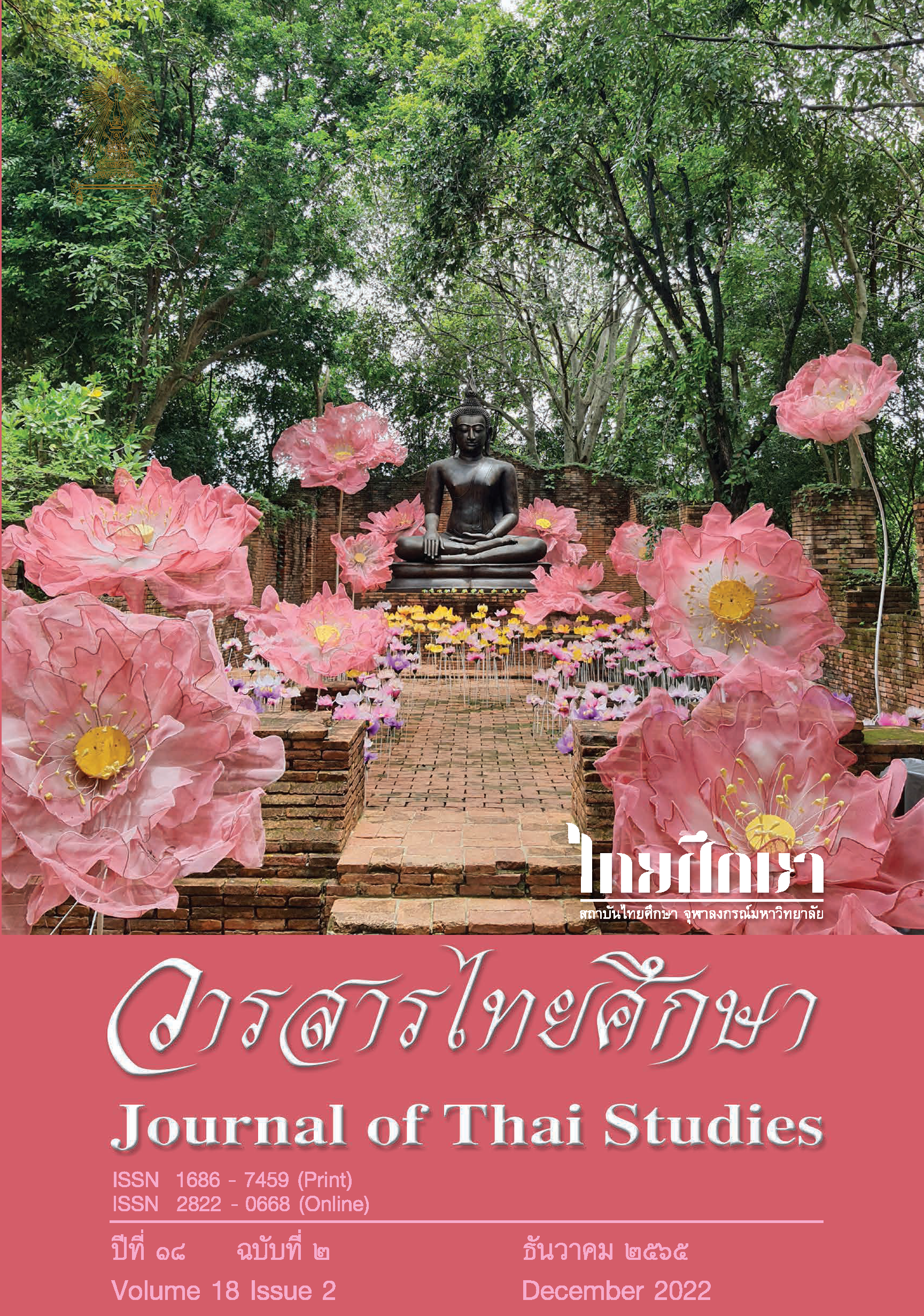The Degree of Intensity of Direct Reprimands and Verbal Irony on the Perception of Native Thai Speakers
Main Article Content
Abstract
This research aimed to examine the degree of intensity of direct reprimands and verbal irony on the perception of Native Thai speakers and to investigate the underlying reasons evaluating the degree of intensity from the perception of hearers. Data were collected from 126 native Thai speakers using online questionnaires comprising 10 situations.
The research revealed that the majority of Thai speakers evaluate verbal irony as having a higher degree of intensity than direct reprimands in the context that the speakers intend to reprimand the hearers. For the reasons evaluating the degree of intensity, it was found that, from the perspective of hearers, sarcastic, satirical, intense, insincere and indignant utterances make verbal irony stronger and more unpleasant than direct reprimands. On the other hand, shortness and abruptness of direct reprimands make them stronger and more unpleasant. Furthermore, linguistic forms were also found as a factor in the evaluation of the degree of intensity of utterances.
Downloads
Article Details

This work is licensed under a Creative Commons Attribution-NonCommercial-NoDerivatives 4.0 International License.
Journal of Thai studies is licensed under a Creative Commons Attribution-Noncommercial-NoDerivatives4.0 Intenational (CC BY-NC-ND 4.0) licence, unless otherwise stated. Plese read our Policies page for more information on Open Access, copyright and permissions.
References
Anansapsuk, O. (2016). Verbal irony in Udom Taepanich’s 7-10 episode stand-up comedy. (Master’s Thesis). Chulalongkorn University, Bangkok, Thailand.
Arunruwiwat, K, et al. (2021). The linguistic strategies for reprimanding on Twitter Application : Case study of an actress’s and a male singer’s love issue. Journal of Humanities, Naresuan University, 18(2), 103-120.
Bergman, M. and Kasper, G. (1993). Perception and performance in native and nonnative apology. In Interlanguage Pragmatics (p. 82-107).
Kasper, G. and Blum-Kulka, S. (eds.) New York: Oxford University Press.
Brown, P. and Levinson, S.C. (1987). Politeness: some universals in language usage. Cambridge: Cambridge University Press.
Bunnag, O. (2017). The functions of verbal irony for commenting via Facebook of mobile operator in Thailand. Vacana Journal of Language and Linguistics, 5(2), 24-40.
Charunrochana, J., M.L. (2013). Theknik kan wichai thang phasasat [Research techniques in linguistics]. Bangkok: Kasetsart University Press.
Gu, Y. (1990). Politeness phenomena in modern Chinese. Journal of Pragmatics, 14(2), 237-257.
Hanks, W.F., Ide, S., and Katagiri, Y. (2009). Towards an emancipatory pragmatics. Journal of Pragmatics, 41(1), 1-9.
Huang, Yan. (2015). The Oxford dictionary of Pragmatics. Oxford: Oxford University Press.
Jaisue, R. (2006). The speech act of complaining in Thai: a case study of university students. (Master’s Thesis). Chulalongkorn University, Bangkok, Thailand.
Kavilanan, S. (2021). The verbal irony used for comment on Facebook in the case of love triangle news in the entertainment industry and cyberbullying: a pragmatics study. Journal of Humanities Naresuan University, 18(1), 103-116.
Krongtong, W. (2004). Communicative strategies and functions of verbal irony in Thai political debates. (Master’s Thesis). Thammasat University, Bangkok, Thailand.
Leech, G. (1983). Principles of Pragmatics. London: Longman.
Maslow, A. H. (1970). Motivation and Personality. New York: Harper & Row.
Mekthawornwathana, T. (2011). The factors used for identifying “Politeness” in male and female conversations among Thai undergraduate students. NIDA Development Journal, 51(3), 141-166.
Ongwuttiwat, S. (2017). Linguistic strategies for responding to complaints in Thai. Ramkhamhaeng University Journal Humanities Edition, 36(2), 63-82.
Panpothong, N. (1996). A pragmatic study of verbal irony in Thai. (Doctoral dissertation). University of Hawai’I, Honolulu, USA.
Panpothong, N. (2012). Ekkasan kham son raiwicha 2201 873 kan wikhro phasa thai tam naeo watchana patibat sat [Teaching materials 2201 783 Pragmatic Analysis of Thai]. Bangkok: Department of Thai, Faculty of Arts, Chulalongkorn University.
Panpothong, N. and Phakdeephasook, S. (2008). The concept of ‘Bunkhun’ and Thai ways of speech behaviors: The case of responding to thanks. Department of Thai, Faculty of Arts, Chulalongkorn University. (Mimeographed)
Pewporchai, P. (2002). Responding to apologies in Thai. (Master’s Thesis). Chulalongkorn University, Bangkok, Thailand.
Rabibhadana, A., M.R. (1994). Krengchai [Krengjai]. In Word: Trace, thinking, Thai belief (p. 299-305). Satha-anand, S. and Boonyanate, N. (eds.), Bangkok: Chulalongkorn University Press.
Rotcharoen, A. (2009). The study of reprimanding language used by Thai politicians. (Master’s Thesis). Kasetsart University, Bangkok, Thailand.
Saengawoot, S. (2014). Reproaches in the passages opining towards political news on internet. (Doctoral dissertation). Kasetsart University, Bangkok, Thailand.
Searle, J. R. (1969). Speech acts: an essay in the philosophy of language. Cambridge: Cambridge University Press.
Searle, J. R. (1976). A classification of illocutionary acts. Language in Society, 5(1), 1-23.
Smithikrai, C. (2021). Chittawitthaya sangkhom [Social Psychology]. (2nd ed.). Bangkok: Chulalongkorn University Press.
Spencer-Oatey, H. (2002). Managing rapport in talk: using rapport sensitive incidents to explore the motivational concerns underlying the management of relations. Journal of Pragmatics, 34(5), 529-545.
Sukwisith, W. (2004). Speech act of reprimanding in Thai. (Master’s Thesis). Chulalongkorn University, Bangkok, Thailand.
Thaithae, S. (2019). Politeness judgment from responding to blame utterances in Thai: perspectives from two generations. Journal of Letters, 48(1), 77-96.


